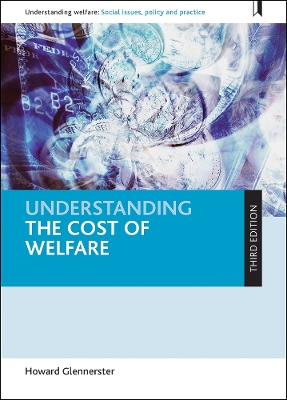Understanding Welfare: Social Issues, Policy and Practice
2 total works
How can society pay for high quality social services? This is perhaps the central political question in the UK today - one that this book sets out to answer. It challenges the belief that easy solutions lie either in extending private funding or taxing the rich. The book makes economic theory and the complex funding arrangements that underpin social policy accessible to students across a range of social science disciplines, including social policy, sociology and social work. "Understanding the finance of welfare": reviews the economic case for public social services; examines the economic and political limits to taxation; analyses the limits to markets as a way of meeting basic human needs; explores in detail the practical ways in which hospitals, schools and other social agencies are funded. In each case the UK's position is contrasted with funding arrangements in other advanced economies; devotes a chapter to the theory and practice of rationing scarce resources and to the public expenditure process.
The challenge of meeting the growing cost of welfare is one of the most pressing issues facing governments of our time. Glennerster's authoritative Understanding the cost of welfare assesses what welfare costs and how it is funded sector-by-sector. The book is written in a clear, accessible style, ideally suited to both teaching and study, and the general reader.
This substantially revised third edition includes:
* Discussion of the many funding issues now facing welfare states, such as demographic change, tax resistance, slow growth and austerity programmes
* The theory and practice of devolved tax and budgetary responsibilities between UK nations and in comparison with other countries
* New chapters on pensions and post-16 education
* More regular and extensive comparative analysis
Divided into 3 sections, covering Principles, Service funding, and The Future, the book Includes questions for discussion and suggestions for further reading, making it an easy-to-use, essential resource for both undergraduate and post-graduate students of Social Policy, Sociology, Politics and Public Administration.
This substantially revised third edition includes:
* Discussion of the many funding issues now facing welfare states, such as demographic change, tax resistance, slow growth and austerity programmes
* The theory and practice of devolved tax and budgetary responsibilities between UK nations and in comparison with other countries
* New chapters on pensions and post-16 education
* More regular and extensive comparative analysis
Divided into 3 sections, covering Principles, Service funding, and The Future, the book Includes questions for discussion and suggestions for further reading, making it an easy-to-use, essential resource for both undergraduate and post-graduate students of Social Policy, Sociology, Politics and Public Administration.

